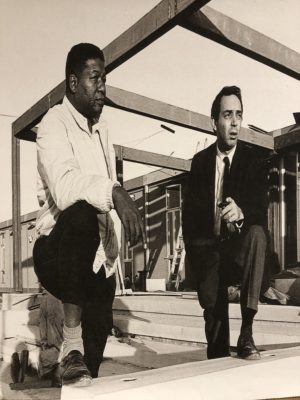By Gary Gunderson
Tuesday marks the sixth year a highly interdisciplinary group has gathered to honor and reflect on the ever-new intellectual witness of Dr. John Hatch.
John Hatch Lecture Series, Register HERE!
My role is frame the occasion, which is supposed to be the opposite of giving a sermon, or worse a lecture. But Dr. Hatch leads a quietly radical life not unlike the good troublesome life of Reverend John Lewis, so I am speaking about Hatch Trouble.
I’m claiming a triple exemption as reverend, writer and academic. Which is to say that I haven’t cleared the comments with our corporate communications office. If one has not risked one’s job, the words are probably not worth speaking or listening to.
I was once asked by a suspicious Board member where this FaithHealth thing came from. I had not expected the question over breakfast, so I said, “Jesus?” And pointed out that Jesus got it from Micah and, for that matter, Genesis. The modern movement began when germs were discovered in the late 1800’s. And the great missionary hospitals around the world–including our own happy to be part of Atrium Health but still often called The Baptist.
 Then in Chicago Granger Westerberg invented Faith Community Nursing about the same time Dr. Jack Geiger and Dr. John Hatch invented the first of now more than 1,400 Community Health Centers.
Then in Chicago Granger Westerberg invented Faith Community Nursing about the same time Dr. Jack Geiger and Dr. John Hatch invented the first of now more than 1,400 Community Health Centers.
The movement of faithhealth has long had a awkwardly close relationship with the power of biomedical institutions and technology. My paycheck has a hospital logo on it, as have many thousands of missionary doctors and nurses. But I fear we have been too successful at integration into the biomedical institutions and not radical enough about the science of healthy human life. Dr. James Bruckner’s wrote a book by that title. A scholar of the Jewish scriptures, he notes many ways the science and ancient witness is an inconvenient truth: that life and health do not stay within the billable containers of healthcare. When the World Health Organization commissioned us to understand and then map the religious health assets relevant to HIV/AIDS in southern Africa, the villagers taught us that we can’t connect what is impossible to separate. We learned the word “Bophelo,” which we awkwardly translate into FaithHealth—no separation, one word.
The FaithHealth movement was fundamental in creating the mission of the World Health Organization–health for all, which echoes in the mission of Atrium Health, too. The Christian Medical Commission and the writings of Carl and Daniel Taylor laid down the intellectual framework which ended up captured by the clinicians and sidelining the liberators. Today, you can find this true taproot in the pedagogy of Future Generations University up in Franklin, WV, which systematically plants seeds of liberation that can grow to scale as sustained health.
We’re especially interested in the social side of the innovation, the one John Hatch learned with the men, women and children picking cotton in Mississippi. He had picked cotton in Kentucky but humbled himself to learn again from and with those on the other side of the sidewalk from the clinic.
But to call it the “social” side is to fall into the intellectual ditch of “social determinants” which conveniently but fatally strip out the psychological and spiritual dynamics that are woven into the social. This is not just impolite, but egregious intellectual malpractice.
Tepid social determinants tempt us to just do mercy with little titrate bits of social stuff, increasingly dispensed by computer algorithms. Yikes!
If they are social at all, the witness of Dr. John Hatch-—and in this year’s series Chief Health Equity Officer Victor Armstrong—the intelligence found on the other side of the sidewalk from the clinic pulls us toward trouble. Good trouble, the work of liberation in what are usually called underserved neighborhoods are under liberated.
Equity, the opposite of disparity, is not just having computers spit out the same pile of stuff. Equity is power and liberation, not just after-you-have-the-condition treatment.
John Hatch 101. Why the white Mississippi legislators tried to prevent the community health center from opening at all.
And why it did anyway, in the parsonage of a nearby church.
And why Dr. Geiger justified buying land and a tractor as part of the prescription against the travesty of malnutrition on the richest soil on the planet.
It is now common to tweak our hospital computers to keep track of social factors of our patients at the same moment insurance companies are hiring many community health workers. This is happening across the country, just as only weeks ago North Carolina inaugurated our state association of community health workers. This is very positive but could be captured by more powerful interests. Platoons of low-wage, but no power, community health workers do not honor this intellectual taproot. Not unless they own their work, share in the gain their work achieves in better outcomes and lower costs. They set people free; literally release the captives.
“Do you want to be healed?” asked Jesus at the pool? “Do you want to be healed,” asked Dr Hatch on the Delta and here at the end of Carolina clay roads. Do the work—community work—that liberates, not just titrates bits of help.
There are those who want religion protected, removed off to the side where it is safe and can chat among itself about whatever. Some claim faith institutions should receive special dispensation even removed from the basics of quarantine law, taking us back before germ theory entirely. Some would use religious freedom as a weapon to undermine the rule of civilized law that allow us to protect ourselves. The Supreme Court, made up of justices who have not picked cotton anywhere, needs to be healed. It is rare for the fullness of faith to be expressed at social scale without a working relationship with the public assets of good government. Nowhere is this more vivid than in the work of many community health centers.
You won’t hear about the privilege of faith today, not standing in the light of Dr. John Hatch. You’ll hear and be invited to listen to the voice already within you calling us to trouble, hatch trouble, good trouble. How to give ourselves away, not accumulate privileges.
When Covid came home two years ago, we all went to time out. I found myself writing, of all things, a book of prayers. When the Reverend John Lewis passed on July last year I went to my knees. On this occasion, that’s probably where we should all be.

